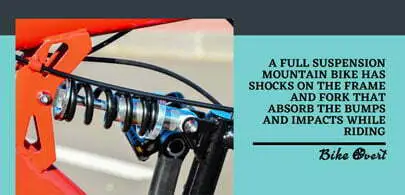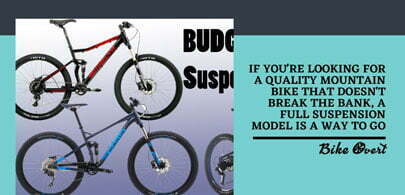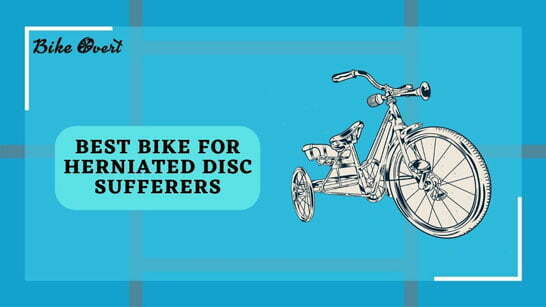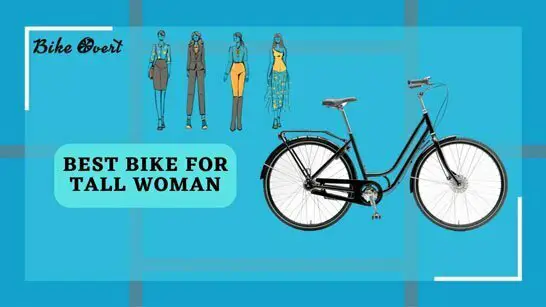Do I really need a full suspension mountain bike? What about an e-bike? Is a hardtail worth the money? The answer to all of these questions depends on your riding style. Here’s a look at the different types of mountain bikes and what type is best for you.
-Hardtails are great for beginners because they are easy to ride.
-Full suspension mountain bikes are best for riders who want a more responsive ride.
If you’re looking for a bike that can handle some serious terrain, a full suspension mountain bike might be the perfect choice for you. Full suspension bikes offer a more comfortable ride, which is perfect if you’re planning on spending a lot of time on your bike exploring rugged trails.
However, full suspension bikes are also more expensive than traditional mountain bikes, so it’s important to decide if the added comfort and stability are worth the price tag. Continuing the article, I am going to talk about some unknown facts on this matter.
What is a full suspension mountain bike?

A full suspension mountain bike has shocks on the frame and fork that absorb the bumps and impacts while riding. This makes the ride more comfortable and can also help to improve traction and control. Full suspension bikes are often heavier than hardtail bikes, but many riders feel that the added comfort is worth the extra weight.
Advantages of a full suspension mountain bike?
When most people think of mountain biking, they imagine a basic hardtail bike with no suspension in the front or back. While this is the most common setup, full suspension mountain bikes have been growing in popularity in recent years. Here are four reasons why you might want to consider buying one:
- Increased comfort – A full suspension mountain bike will absorb more of the bumps and shocks that come from riding over rough terrain. This can make for a more comfortable ride, especially on longer rides.
- Increased stability – A full suspension system helps to keep the bike more stable when riding over bumpy terrain, which can lead to a smoother and more controlled ride.
- Increased traction – The additional suspension in the back of the bike helps to keep the rear wheel planted on the ground, providing more traction and better control when riding over rough terrain.
- Better off-road performance- The benefits of a full suspension mountain bike are not limited to the road. In fact, the full suspension system in the back of a mountain bike can help improve off-road performance.
- Ease of maintenance- With a full suspension system, there are fewer parts to maintain and less potential for problems. This helps to keep the bike running smoothly, and reduces maintenance costs.
- More comfortable ride- The full suspension system in the back of a mountain bike provides a more comfortable ride over rough terrain, making it easier for riders to stay on their bikes for longer periods of time.
Disadvantages of full suspension mountain bike
There are a few disadvantages of full suspension mountain bikes when compared to hardtail mountain bikes.
- They are heavier- One is that they are often heavier due to the additional suspension components.
- They are more expensive- The full suspension mountain bikes are usually more expensive than their hardtail counterparts.
- They require more maintenance- The full suspension mountain bikes are more complicated and need more maintenance than their hardtail counterparts. Additionally, because there are more moving parts on a full suspension bike, it can be more difficult to maintain and repair them.
- Not high speedy like a hardtail on a smooth surface- The mountain bike makes the best choice when you want to go over rocks and rough terrain. With a hardtail bike, you will get a higher speed than a full suspension bike on a plain surface.
How to find the best budget full suspension mountain bike?

If you’re looking for a quality mountain bike that doesn’t break the bank, a full suspension model is a way to go. However, with so many options available, it can be tough to find the best full-suspension mountain bike that are fully within the budget. Here are a few tips to help you get started:
- Decide what type of riding you’ll be doing. If you’re mostly just going to be hitting the trails around your neighborhood, a basic hardtail model will do the trick. But if you plan on taking your bike on more challenging terrain, you’ll need a full suspension version with beefier components.
- Do your research. There are tons of great online reviews and comparison tools available that can help you find the perfect bike for your needs and budget.
- Consider your budget carefully. It’s important to get the right bike for your needs, don’t forget to consider your budget. If you’re on a tight budget, you may have to look at bikes that are less expensive and still provide the same quality you need.
- Make sure the bike fits you. A good quality bike will give you a better riding experience and ultimately more fun. The more comfortable you are on your bike, the more enjoyment you’ll get from it.
- Try out the bike before you buy it if possible. It is not always possible. However, just because a bike looks great doesn’t mean that it’s going to be a good fit for you. Try riding it for 30 minutes to an hour, get on and off quickly and check how easy it is to do jumps and tricks on the bike.
Is a full suspension mountain bike worth it?
Mountain biking is a great way to get outside and enjoy the fresh air. For those who are new to the sport, deciding which bike to buy can be overwhelming. There are many options available, including hardtail and full suspension mountain bikes. So, is a full suspension mountain bike worth it?
The answer to that question depends on your needs and preferences. If you’re looking for a bike that will allow you to ride over more challenging terrain, then a full suspension mountain bike may be the better option. Full suspension bikes are designed to provide more cushioning and stability when riding over rough terrain. They also tend to be heavier than hardtail bikes, so if you’re looking for a lightweight option, a hardtail may be better for you.
Ultimately, the decision of whether or not to buy a full suspension mountain bike comes down to personal preference.
Is a hardtail faster than a full suspension?
There are many factors to consider when deciding if a hardtail is faster than full suspension. The first consideration is the type of terrain you will be riding. Hardtails are generally faster on flat terrain, while full suspension bikes are better for downhill and more technical trails.
The weight of the bike is also a factor to consider. Hardtails tend to be lighter than full suspension bikes, which can make them easier to pedal uphill. However, full suspension bikes offer more cushioning and can be more comfortable on long rides.
Ultimately, the decision of whether a hardtail or full suspension bike is faster depends on the individual rider’s preferences and riding style. Some riders prefer the responsiveness and simplicity of a hardtail, while others prefer the extra cushioning and stability of a full suspension bike.
Can you mountain bike with no suspension?
If you’re looking for an extreme workout, you might be wondering if it’s possible to mountain bike without suspension. The answer is yes – but it’s not easy!
Without suspension, every bump and rock on the trail will be felt in your body. This can make for a very challenging ride, especially on uneven terrain. If you’re looking to avoid any pain or discomfort, it’s best to stick to paved trails or dirt roads.
That said, there are some benefits to mountain biking without suspension. For one, it can be more affordable – since you don’t need to purchase a quality suspension fork.
When should I switch from hardtail to full-suspension?

If you’re just starting out mountain biking, I would recommend sticking with a hardtail bike. They’re simpler to operate and maintain, and tend to be more affordable. Full-suspension bikes are more complex and can be more expensive to maintain.
That said, if you’ve been mountain biking for a while and are looking to upgrade your ride, I would definitely recommend considering a full-suspension bike. They offer much better performance on challenging trails and can provide a smoother ride on less technical terrain as well.
If you’re the kind of person that enjoys wheeling around on bikes, don’t spend your hard-earned money purchasing your most recent bike without reading our latest article that covers mountain biking in significant detail. Whether you’re an amateur just setting out, or an expert looking to refine your skills, this article has all you need to succeed.
Does suspension slow down your bike?
There are a lot of factors to consider when it comes to how well your mountain bike performs. One question that often comes up is whether or not suspension affects speed. In short, the answer is yes. Suspension does slow you down, but there are a lot of other factors to consider as well.
The amount of drag created by suspension varies depending on the type and quality of the suspension. Hardtail mountain bikes without suspension create about 10% more drag than those with suspension, while full-suspension bikes can create up to 30% more drag. This added drag can significantly reduce your speed and increase your effort required to ride at a given pace.
That said, there are a lot of other things that affect speed as well.
Hardtails or full suspension mountain bikes which is more fun?
There are many debates in the mountain biking world. Some people swear by their hardtails while others can’t imagine riding without their full suspension. So, which is more fun?
That really depends on what you are looking for in a mountain bike. If you want a bike that is more responsive and easier to maneuver, then a hardtail might be better for you. Hardtails tend to be lighter and simpler than full suspension bikes, making them easier to pedal and faster to react to changes in terrain.
However, if you are looking for a more forgiving ride and don’t mind the extra weight, then a full suspension might be the way to go. Full suspension bikes absorb shock better than hardtails, making them more comfortable on bumpy trails.
Conclusion
In conclusion, while a full suspension mountain bike may not be necessary for everyone, it can be a helpful tool for those who are looking to take their mountain biking experience to the next level. If you are interested in purchasing a full suspension mountain bike, be sure to do your research and find the right one for you. With the right bike, you can enjoy hours of fun on the trails.




